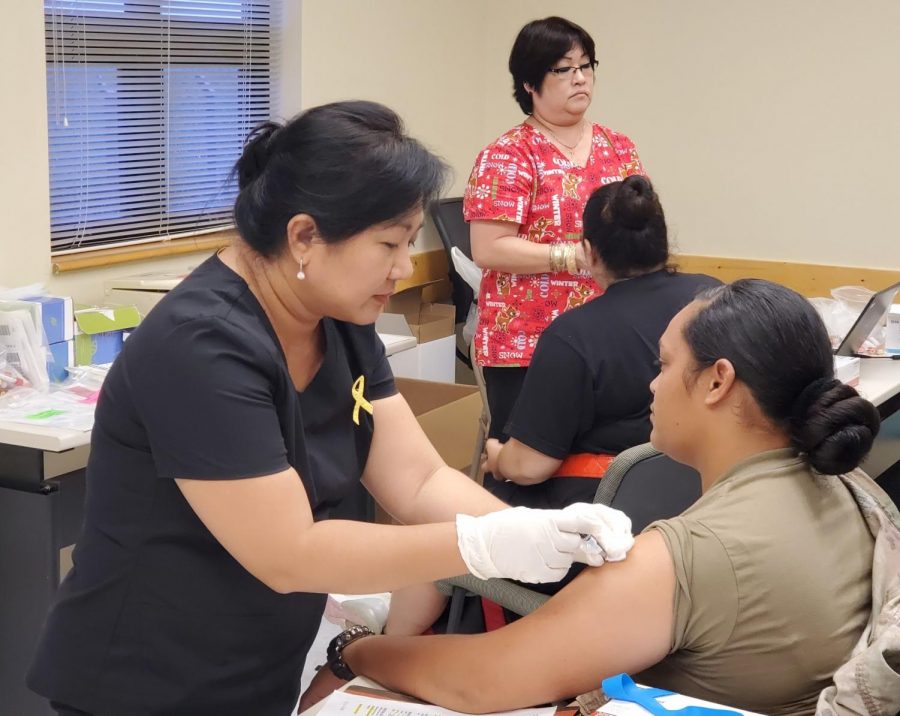Measles outbreak continues in Samoa
The fight against vaccines has been slowly tapping away at American social politics for years now. However, the threat of unvaccinated diseases became apparent on a large scale as Samoa began suffering a severe measles outbreak in early October.
According to ABC News, a mistake in the administration of 2018 measles vaccinations caused the death of two babies, resulting in the brief shutdown of the country’s vaccination program. Although the issue was quickly discovered and labeled as a mere practitioner’s mistake, the incident caused Samoan mothers to cast severe doubts on the vaccination process.
Going into October 2019, only about 30% of the Samoan population was vaccinated against measles, CBS News reports. On Oct. 16, the country declared an official measles outbreak and began taking measures to increase vaccination rates and minimize the spread of the disease.
The Center for Disease Control (CDC) defines measles as a “highly contagious virus,” which increases chances for spread throughout poorly vaccinated areas. “If other people breathe the contaminated air or touch the infected surface, then touch their eyes, noses, or mouths, they can become infected. Measles is so contagious that if one person has it, up to 90% of the people close to that person who are not immune will also become infected,” (CDC).
Since the declaration of the outbreak, nearly 4,700 people have been infected in Samoa and 70 have been killed, according to ABC News. The undeveloped immune systems of children make them particularly susceptible to the disease, which has resulted in 90% of deaths being from children under the age of 15.
By the end of November, the outbreak spiralled into a national crisis. The Samoan government notified all citizens that they must receive the vaccine as part of precautionary measures, but the disease was spreading faster than people could access the treatment.
In response, the Samoan government mandated a curfew for Dec. 5 and 6 which would allow mobile vaccinators to bring up the numbers of those protected without hindrance from active business and work schedules, according to reports from the Washington Post.
Recent Wall Street Journal reports state that officials visited homes of over 20,000 unvaccinated people, greeted by red flags outside each door indicating residents’ susceptibility, and successfully raised the vaccinated population to around 90% of eligible residents. While the outbreak has not yet slowed, the vast increase in vaccinated citizens should allow for a steady lift of the nation-wide emergency.
While the immediate danger should soon be gone, the widespread issue still remains; the prevalence of measles and other vaccinated diseases is on the rise. In the U.S., according to the Wall Street Journal, the number of measles cases has reached an all-time high since 1992, with an outbreak occurring in New York earlier this year.
For a variety of reasons, people seem to have become wary of the vaccination process. Avid “anti-vaxxers” declare a connection between vaccinations and autism. Some parents reject the idea of western medicine. Others merely worry about the rare cases of negative medical conditions linked with vaccines.
Early College student Tara Bolmer recalls her parents’ concerns about the possible side effects of vaccinations. An immigrant to the U.S., Bolmer’s mother was at first suspicious of the vaccines.
“I don’t know why she wouldn’t have (vaccinated me),” Bolmer said. “Now I’m safe from diseases like meningitis which my mom had in her teenage years, leaving her with severe hearing loss.”
Bolmer considers herself to be very pro-vaccines. “Vaccinations are necessary in today’s society to prevent the spread of preventable disease and protect those with weaker immune systems who are susceptible to them.”
Early College student Zamiarra Zarsona agreed with Bolmer, expressing her lack of understanding for those who did not vaccinate, especially during an outbreak like Samoa’s that “probably could’ve been prevented.”
In fact, one of the only downsides to vaccination that Zarsona could list was “your arm hurts.” She emphasized the ease of getting vaccinations in contrast to the disastrous effects the opposite could cause.
These consequences have been highlighted in Samoa’s case, and similar effects have been seen in the United States, where vaccine-preventable diseases cause about 50,000-90,000 deaths a year, according to the Alliance for Aging Research.
“By refusing to vaccinate yourself, or your kid, you’re just putting both yourself and other people in danger,” said first-year student Kaci Shults.
In order to prevent cases like the measles outbreak in Samoa from happening again, taking a look at the source—an unvaccinated population—and promoting beneficial health practices may be promising first steps.











